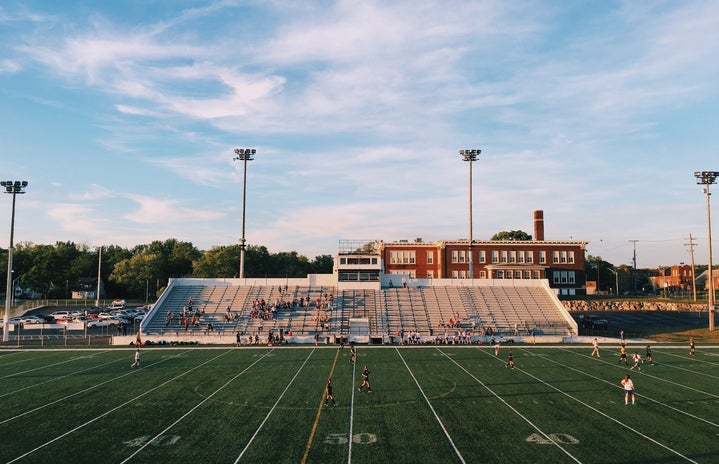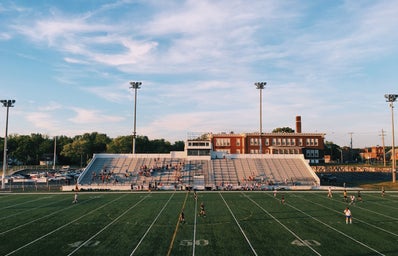“Left side. Strong Side.”
These four words are still as influential in the lives of movie and sports lovers today as they were when “Remember the Titans” was released 20 years ago.
With Denzel Washington taking on the leading role, this film tells the heartwarming true story of how a high school football team in the racially charged Alexandria, V.A. overcame its racial differences to win the title of state champions. This film conveys a message that the color of a person’s skin does not define who they are, and that racism doesn’t play any part in a team. Instead, it is the content of their character: their kindness, their strength, their humor, their intelligence, and so on.
However, with the brutal murder of George Floyd, Breonna Taylor and over 150 other Black Americans in 2020 alone at the hands of police brutality, the messages this film teaches viewers about race have potentially been lost in translation.

The film takes place in 1971, when T.C. Williams High School decided to replace their white head football coach, Bill Yoast (Will Patton), with a Black man, Herman Boone (Denzel Washington), to appease racial tensions in Alexandria. This garnered outrage from white people in the community, as they feared having a Black head coach would undermine the whole organization and their white children would get less playing time.
With winning on the brain, Coach Boone decided not to allow all the white community’s anger and resentment to break his spirits. To allow for a smooth transition throughout the community, Boone requested that Yoast remain the defensive assistant coach. Yoast initially declined, but when his star white players threatened to boycott the season without him, he felt pressure to accept Boone’s offer.
With Yoast on his side, Boone had the challenge of convincing his players to get along with one another. While at a two-week preseason football camp in Gettsyburg, P.A., a constant rivalry between the white players and the Black players ensues. The team’s white captain, Gerry Bertier (Ryan Hurst), and the Black captain, Julius Campbell (Wood Harris), continually clash both on and off the field, setting the tone for the rest of the team.
Sick of the fighting, Coach Boone decided to take the team on a long, reflective run through the battlefields of Gettysburg. While there, Boone gave an empowering speech on the importance of remembering that the fight over racial equality did not end just because 50,000 men died during a battle on the very ground they stood on. Instead, that battle was still raging on amongst each of them and the country.
“You listen, and you take a lesson from the dead,” he said. “If we don’t come together right now on this hallowed ground, we too will be destroyed, just like they were. I don’t care if you like each other or not, but you will respect each other. And maybe … I don’t know, maybe we’ll learn to play this game like men.”

After hearing those words, the teammates finally start to unite. One of the most touching moments in the film occurs when Campbell and Bertier come together after an amazing left side block on which they collaborate and chant the famous line, “Left Side. Strong Side,” signifying the start of an alliance, and ultimately a unique and special friendship.
By the end of the rousing two-week camp, the Titans were a strong and unified team. However, they eventually had to leave the peace they had achieved at Gettysburg and face the sad reality that they were still living in a community divided by race.
When the first day of school arrives, the newly integrated Black students were met with crowds of screaming white people armed with signs of protest and malice in their hearts. To escape the rampant racism surrounding them, the Titans continued to work hard to prepare for their first game. Coach Boone was told by a school board member that if he lost a single game, he would be removed from his position.
With the pressure of knowing that one loss could cost him his job and reputation, and further realizing the pressure of his performance as a Black man, Coach Boone went into the first game unsure if his team will perform well. To his and the rest of the community’s surprise, the Titans were triumphant, fueled by a bond of brotherhood. The team continues to win game after game, uniting the community along the way.
In the end, the Titans had a perfect season, winning thirteen games and taking home the title of state champions. However, it wasn’t the number of tackles or touchdowns scored that set the Titans apart. Instead, it was the dedication and determination of Coach Boone and every player on that team to heal a community torn apart by racism.
The Titans were met with countless skeptics and people rooting for their failure. Instead of allowing that negativity to consume them, the team and coaches rose above it and used it as motivation. They established their own hallowed grounds on the high school ball fields of Virginia and showed their community that there is more to a person than their race.

Nearly 50 years after this film takes place, our country is still engaged in the same fight for equality that Coach Boone and the Titans had to confront regarding race. There is still so much hatred and bigotry today. Every day, Black Americans wake up afraid that they will be shot for a simple traffic stop or in their own homes without any reason.
I can’t imagine living with that fear. As a white woman, I will not pretend to understand the bias and hatred that still exists toward Black citizens. I will, however, continue to believe that if we come together as a team with a common goal for the common good, we will prevail. Julius and Gerry’s words ring through my mind every day: “Left side. Strong Side.”
Today and every day, we need to remember the lessons that Coach Boone and the Titans taught us about the importance of not judging people based on their race. Society needs to understand that a person’s race does not speak to their character. And we need to remember that when we work together, anything is possible, and we can- and will- silence the skeptics.

The final line of “Remember the Titans” sums it up best:
“People say that it can’t work, black and white; well here we make it work, every day. We have our disagreements, of course, but before we reach for hate, always, always, we remember the Titans.”
I know I will.
Photos: Her Campus Media



